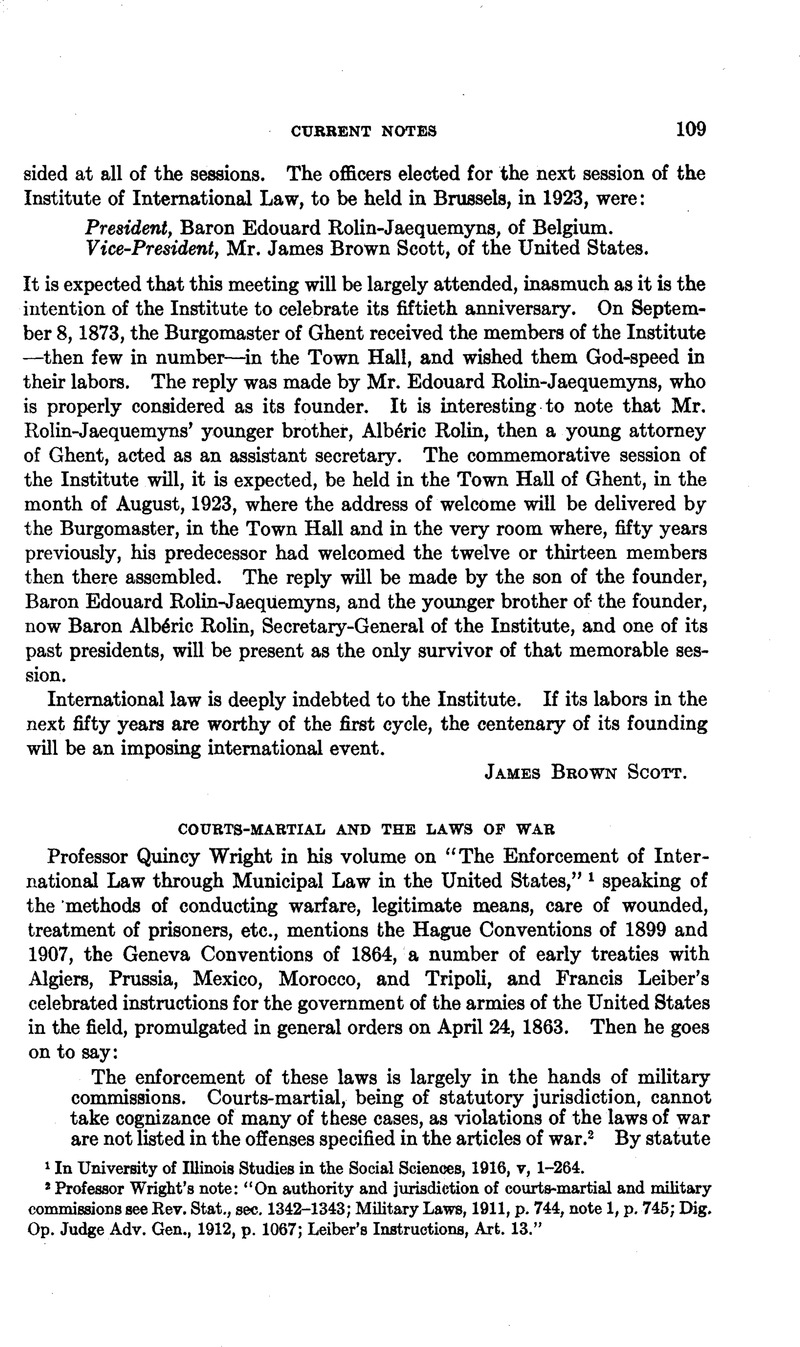No CrossRef data available.
Article contents
Courts-Martial and the Laws of War
Published online by Cambridge University Press: 06 June 2017
Abstract

- Type
- Current Notes
- Information
- Copyright
- Copyright © American Society of International Law 1923
References
1 In University of Illinois Studies in the Social Sciences, 1916, v, 1-264.
2 Professor Wright's note: “ On authority and jurisdiction of courta-martial and military commissions see Rev. Stat., sec. 1342-1343; Military Laws, 1911, p. 744, note 1, p. 745; Dig.Op. Judge Adv. Gen., 1912, p. 1067; Leiber's Instructions, Art. 13.”
3 By the Articles of War an officer must keep good order and “ to the utmost of his power,redress all abuses and disorders which may be committed by an officer or soldier under his command, (Art. 54) and officers guilty of conduct unbecoming an officer and a gentleman may be dismissed” (Art. 61).—Professor Wright's note.
4 Smith, Justin H., The War with Mexico, vol. ii, p. 211.
5 Smith, op. tit., vol. i i , p. 220.
6 Ibid., pp. 455-456.
7 This order is cited as a convenient example. It is of course realized that it was issued while the old Manual for Courts-Martial, 1916, was still in force; but the revised Manual (1921) does not differ from it in these respects. The new Manual is the one cited here, for convenience in reference.
8 Dig. Op. J. A. G., 1912, p. 511.
9 Wright, op. cit., p. 38. See Coleman v. Tennessee, 97 U.S. 509, (a case involving murder);also “ The jurisdiction of the court-martial becomes exclusive the instant the army leaves our national boundaries,” Glenn, The Army and the Law, p. 91.
10 41 Stat. 759.
11 The Lieber Code, in its original form as General Order 100, 1863, has been recognized by the Supreme Court as obligatory on the Army. Ex parte Vallandigham, 1 Wall. 243.
12 Dig. Op. J. A. G., 191?, p. 148.
13 Ibid., p. 143.
14 Manual for Courts-Martial, 1921, pp. 33-34.
15 Chapter n, Act of June 4, 1920, (41 Stat. 787).
16 Articles of War, 12,15.
17 Ibid., 15, 80, 81, 82.
18 Except where the military commission is also given express statutory jurisdiction of the offense. Articles of War, 80, 81, 82.
19 Article of War, 78.
20 Ibid., 88.
21 Manual for Courts-Martial, 1921, p. 2.
22 Att. Gen. Cushing, 6 Op. 413, 417.
23 See Carrington v. U. S., 208 U. S. 1.
24 Dig. Op. J. A. G., 1912, p. 140. See Carter v. McClaughry, 183 U. S. 365.
25 Ibid., pp. 141-143.
26 Grafton v. V. S., 206 U. S., 333.
27 Manual for Courts-Martial, 1921, p. 26.
28 11 Op. Att. Gen. 19, 21.
29 See opinion of Story in Martin v. Mott, 12 Wheat. 28.
30 Ch. xiv, par. 7.
31 Cf. the Leipzig trials of war criminals, this Journal, Oct. 1922, pp. 674-724.
32 As Finch, G. A. has stated, 15 Amer. Jotjr. In t . Law, 440, it is held in the Buies of Land Warfare of the United States Army, 1914, par. 366; in Oppenheim, 1912 ed., sec. 253; in the British official Manual of Military Law, 1914, ch. xiv, par. 443 (in the writing of which Oppenheim collaborated), and in the United States Supreme Court, Martin v. Mott, 12 Wheat. 28, that violations in accordance with orders render responsible only the commander issuing the order, and not the subordinate who carries it out. The French, however, would hold responsible the commander who issues an improper order, the subordinates who transmit it, and the individual who carries it out (see Garner in 14 Amer. Jour . In t . Law, 70),evidently assuming that inferiors should disobey, as when Colonel Peters disobeyed an order to burn Chambersburg in 1865 during the Civil War. (Stowell and Monroe, International Cases, Vol. II, pp. 235-6.)Google Scholar
33 Finch, G. A. 14 Amer. Jour. Int. Law, 218, citing Ford v. Surget, 97 U. S. 605; Coleman v. Tennessee, 97 U. S. 509; Dow v. Johnson, 100 U. S. 158; and Freeland v. Williams, 131 U. S. 405.Google Scholar


